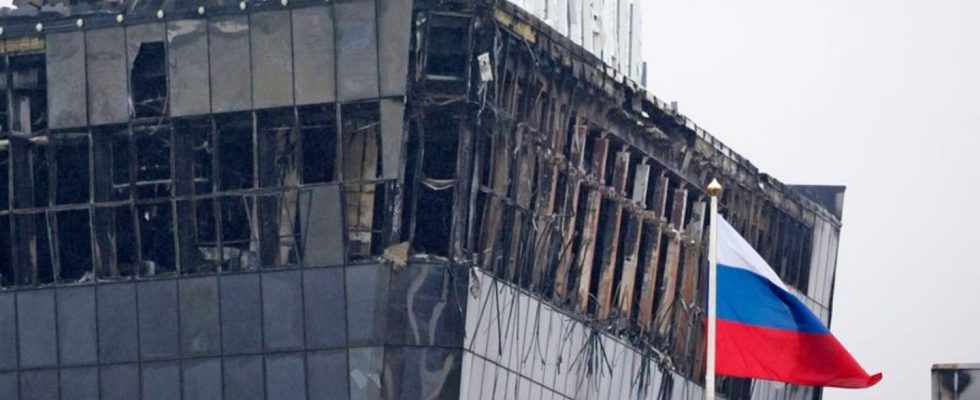Russia
Further arrest warrant after terrorist attack in Moscow
View of the Crocus City Hall in northwest Moscow after the terrorist attack. At least 139 people were killed and around 200 others were injured. photo
© Vitaly Smolnikov/AP/dpa
After the attack in Moscow, Russian politicians insist that the trail leads to Ukraine. Moscow’s ally Lukashenko in Belarus is raising doubts about this version.
Last Friday, terrorists stormed the Crocus City Hall concert hall in the city of Krasnogorsk near Moscow, killing at least 139 people. Around 200 others were injured. The terrorist militia Islamic State (IS) later claimed responsibility for the attack. Western security authorities and experts suspect the IS offshoot Islamic State Khorasan Province (ISPK) is behind it.
Russian politicians stick to their Ukraine thesis
Russian politicians and propagandists, however, continued to dismiss the IS claims of responsibility and claimed that Ukraine was behind the attack. The secretary of Russia’s National Security Council, Nikolai Patrushev, said that “of course Ukraine” was responsible for him. A little later he backtracked and told a Russian television reporter about Ukrainian involvement: “There are a lot of indications of that.” He also admitted that the investigation is still ongoing and the outcome remains to be seen.
Kremlin leader Vladimir Putin appeared somewhat more reserved. He is counting on the Russian Prosecutor General’s Office to do everything to “ensure that the criminals receive a fair punishment, as required by Russian law.” On Monday, Putin confirmed that the attack on Crocus City Hall was carried out by Islamist terrorists. At the same time, as he did at the weekend, he made it clear that he sees a Ukrainian trail. Russia wants to know “who the client is.” Putin therefore assumes that Islamists committed the mass murder, but that the masterminds are located elsewhere. He sees a motive in Ukraine, not IS. Ukraine rejects this.
As an indication of this theory, Putin said that the four suspected shooters fled towards an alleged loophole through the Ukrainian border. They were arrested on Saturday in the Bryansk border region. Belarusian leader Alexander Lukashenko said the men may have wanted to flee to his country. In Belarus, which also borders the Bryansk region, security precautions have been taken. “That’s why they couldn’t get to Belarus. They saw that. That’s why they turned around and drove towards the Ukrainian-Russian border,” Lukashenko said, according to the state agency Belta.
Two assassins were in Turkey
According to Turkish security circles, two of the suspected attackers were in Turkey before the attack. The German Press Agency learned that they arrived at different times and stayed in hotels in Istanbul. On March 2nd they traveled from Istanbul to Moscow on the same flight. They were able to move freely in Turkey because there was no arrest warrant. The two only stayed in the country for a short time. It is therefore not assumed that they became radicalized in Turkey.
Because of the terrorist attack, discussions about reinstating the death penalty have flared up in Russia. Head of Parliament Vyacheslav Volodin believes this can be done quickly. “In our constitution and criminal law, no one has abolished the death penalty,” he said in the State Duma. The Constitutional Court could decide on the application. No referendums or other decisions are necessary. There is currently a moratorium on the use of the death penalty in Russia. The last death sentence by shooting in Russia was carried out in 1996 under President Boris Yeltsin.

